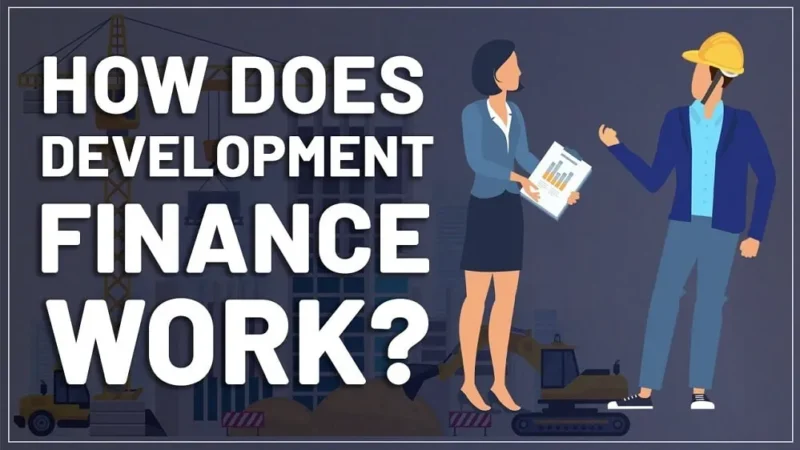What Are The Benefits of Development Finance UK?

Table of Contents
ToggleDevelopment finance benefits UK :
Do you have a property development project in mind? Are you looking for financing to make your dream a reality? If so, development finance in the UK may be the perfect solution for you.
Development finance is a loan designed to help property developers finance their projects. It can cover various costs, including land purchase, construction, and marketing.
Here are some of the benefits of development finance in the UK:
Flexibility
Flexibility in the context of development finance refers to the ability of the lender to tailor the loan terms to the developer’s and the project’s specific needs. This includes the interest rate, repayment schedule, and any fees.
Flexibility is important for development finance because it allows lenders to consider each project’s specific risks and challenges. This can reduce the risk of default and make the project more likely to succeed.
Lenders can provide flexibility in development finance in a few different ways. One way is to offer a variable interest rate. This means that the interest rate on the loan will fluctuate over time based on market conditions. This can be helpful for developers who are still determining how their project will perform financially.
Another way to provide flexibility is to offer a grace period. This is a period during which the developer does not have to make any payments on the loan. This can be helpful for developers who need time to get their project started or are experiencing financial difficulties.
Finally, lenders can also provide flexibility by offering loan options tailored to the developer’s and the project’s specific needs. For example, a lender might offer a loan that allows the developer to repay the loan in instalments or that allows the developer to prepay the loan without penalty.
The amount of flexibility that a lender is willing to provide will depend on a number of factors, including the project’s size and complexity, the developer’s experience, and the lender’s own risk appetite. However, flexibility is an important consideration for any developer seeking development finance.
Here are some specific examples of how flexibility can benefit developers:
- A developer working on a project in a new market may need flexibility to adjust the loan terms if the market conditions change.
- A developer working on a complex project may need flexibility to change the project as it progresses.
- A developer experiencing financial difficulties may need flexibility to defer payments on the loan or renegotiate the loan terms.
Overall, flexibility can be a valuable tool for developers seeking development finance. It can reduce the risk of default and make the project more likely to succeed.
Access to larger sums of money
One of the benefits of development finance is that it can provide access to larger sums of money than other types of loans. This is important for developers who are undertaking large or complex projects.
For example, a new apartment complex developer may need to borrow millions of pounds to finance the project. This type of loan would be difficult to obtain from a traditional bank. However, a development finance lender may be willing to provide the loan, given the potential for high returns on the investment.
Of course, there are risks associated with borrowing large sums of money. If the project is successful, the developer may be able to repay the loan. However, the potential rewards can be significant.
Here are some of the factors that development finance lenders consider when deciding whether to lend a large sum of money:
- The experience of the developer: Lenders will want to see that the developer has a proven track record of success.
- The size and complexity of the project: Larger and more complex projects require more due diligence from the lender.
- The market conditions: Lenders will want to ensure the project is viable in the current market conditions.
- The security offered by the developer: Lenders will want to be repaid if the project is unsuccessful. This could include securing the loan against the property being developed or against the developer’s assets.
If you are considering borrowing a large sum of money for a development project, speaking to a specialist lender to get advice on whether it is the right option is essential.
Here are some additional things to consider when deciding whether to borrow a large sum of money:
- Your own financial resources: Do you have enough money to cover your living expenses and other debts if the project is unsuccessful?
- The risks involved: Are you prepared to take on the risk of losing your investment if the project is not successful?
- The potential rewards: What are the potential rewards of the project? Are they worth the risks involved?
No personal guarantees
A personal guarantee is a legally binding document that makes the borrower personally responsible for repaying a loan. This means that if the borrower defaults on the loan, the lender can go after the borrower’s personal assets, such as their home or car.
In the context of development finance, a no personal guarantee loan is a loan that does not require the borrower to provide a personal guarantee. This can be a valuable benefit for borrowers who do not want to risk their personal assets on a development project.
However, it is important to note that no personal guarantee loans are typically more difficult to obtain than loans that require a personal guarantee. This is because lenders are taking on more risk when they do not have the borrower’s personal assets as collateral.
Faster funding
Faster funding is a benefit of development finance that can be important for developers who need to get their projects off the ground quickly.
Development finance lenders can offer faster funding in a few different ways. One way is to have a streamlined application process. This means the lender will require less documentation and decide on the loan application more quickly.
Another way to offer faster funding is to have a shorter approval process. This means that the lender will take less time to review the loan application and make a decision.
Finally, lenders can also offer faster funding by providing bridging finance. This type of short-term loan can be used to bridge the gap between when the developer needs the money and when they receive the money from the permanent lender.
The time it takes to get funding will vary depending on the lender and the specific project. However, development finance lenders typically offer faster funding than traditional lenders.
Potential for higher returns
Yes, development finance can offer the potential for higher returns than other types of investments. This is because development projects can often generate significant profits. However, it is important to note that development finance is also a more risky type of investment. This is because the lender is exposed to the risk that the project will not be completed or that it will not generate the expected profits.
Here are some of the factors that can contribute to the potential for higher returns in development finance:
- The project’s location: Projects located in areas with strong economic growth potential or high demand for housing or commercial space can be more likely to generate high returns.
- The type of project: Some projects, such as infrastructure projects or projects that develop new technologies, can be more likely to generate high returns than others.
- The experience of the developer: Developers with a proven track record of success are more likely to be able to complete projects on time and on budget, which can increase the potential for returns.
- The market conditions: Favorable market conditions, such as low-interest rates and strong demand for property, can also contribute to the potential for higher returns.
It is important to note that there is no guarantee of high returns in development finance. The potential for returns is always weighed against the risks involved. Investors should consider their investment objectives and risk tolerance before investing in development finance.
Here are some additional things to consider when investing in development finance:
- The amount of money you are willing to invest: Development finance is a high-risk investment, so you should only invest money you can afford to lose.
- The length of time you are willing to invest: Development projects can take several years to complete, so you should only invest money that you are willing to tie up for that time.
- The level of risk you are comfortable with: Development finance is a high-risk investment, so you should only invest if you are comfortable with the level of risk involved.
If you are considering investing in development finance, speaking to a financial advisor to get advice on whether it is the right investment for you is essential.



